Podcast: Play in new window | Download (Duration: 58:10 — 41.9MB)
We begin with “My Old Kentucky Home” by 19th century songwriter Stephen Foster, performed by Paul Robeson. Sung like a love song to the state of Kentucky by the Derby crowd at Churchill Downs, its real historical meaning is bleaker. The lyrics portray heartbreak: A man, sold down the river to work at a sugar plantation in the deep south, takes his last look at home. The man is of course, an enslaved black man, or in Foster’s lyrics a so-called “darkie.” This racist descriptor was changed to “people” as the song moved out of its time. But this erases essential history.
That history is given full voice in The American Slave Coast: A History of the Slave-Breeding Industry, by Constance and Ned Sublette.
It’s an extensive accounting of American slavery, documenting the ways the brutal institution thrived in spite, or rather because, of the end of America’s involvement in the African slave trade in the early 19th century.
SEGMENT ONE
With the federal prohibition of new “imports”—people brought from Africa to subjugate—the domestic interstate slave trade boomed. It soon became an essential part of the financial economy, and human captivity: a generational affair.
If a slave was an investment in a productive commodity, then a family of slaves functioned like a human savings account, one that accrued interest in the form of newborns, whose only birthright was a cash value.
SEGMENT TWO
If it’s even possible to wrap our heads around the pervasive culture and economics of Antebellum slavery, what do we do with that awareness in our current context? The authors coincidentally finished writing their book right on the cusp of the black lives matter movement.
And our conversation took place just as Donald Trump was in the final stretch of his regressive candidacy for president: a fitting through-line that traces back to America’s history of generational subjugation and a totalitarian culture — a police state in other words — that the slave south instituted to protect their institution.
SEGMENT THREE
By the time Lincoln signed the Emancipation Proclamation, generation after generation of total oppression had already created accumulations of wealth that built upon themselves for whites — and in the same way, generationally recursive accumulations of disadvantage for African Americans: an algorithm for repression that’s still running two centuries later.
 GUESTS
GUESTS
Ned Sublette is the author of Cuba and Its Music, The World that Made New Orleans, and The Year Before the Flood. Constance Sublette has published, as Constance Ash, three novels and edited the anthology Not of Woman Born.
MUSIC
“My Old Kentucky Home” performed by Paul Robeson
“I Be So Glad When the Sun Goes Down” by Ed Lewis
“Wade in the Water” by Sweet Honey in the Rock
“Slavery Days” by Burning Spear
 UP NEXT
UP NEXT
Reimagining Activism:
As we head into the inauguration of President-elect Donald Trump, a local group says NO. No to the erosion of civil liberties and the end of any semblance of a democratic society. We welcome organizers of Inaugurate the Revolution, a group seeking to transfer power into the hands of the disenfranchised, and to dismantle the systems of oppression that silence and make invisible so many of the country’s citizens. To reimagine activism is to define revolution as a radical act of love.
CREDITS
Producer & Host: Doug Storm
Assistant Producer & Editor: Rob Schoon
Board Engineer: Jennifer Brooks
Executive Producer: Joe Crawford
 WFHB Bloomington Community Radio
WFHB Bloomington Community Radio


